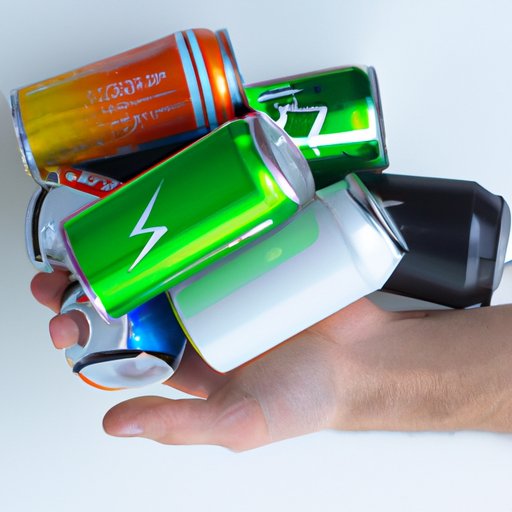Introduction
Energy drinks have become increasingly popular in recent years, with their bright packaging and promises of a “boost” of energy. But what are energy drinks, and why are they bad for you? In this article, we will explore the health risks of energy drinks and provide tips for reducing their consumption.
Definition of Energy Drinks
Energy drinks are non-alcoholic beverages that contain stimulants such as caffeine, taurine, guarana, and B vitamins, which are intended to give the consumer an extra boost of energy. While some energy drinks contain natural ingredients, many also contain artificial sweeteners, flavors, and colors.

Overview of the Health Risks of Energy Drinks
Energy drinks can be dangerous if consumed in excess. The high levels of caffeine and other stimulants can lead to insomnia, increased heart rate and blood pressure, headaches, dehydration, and even addiction. In addition, the additives used in many energy drinks can have negative health consequences. Thus, it is important to understand the potential risks of consuming energy drinks before making them part of your regular diet.
Exploring the Health Risks of Energy Drinks
The Caffeine Content of Energy Drinks and its Effects
Energy drinks contain high levels of caffeine, which can cause a number of adverse health effects. According to a study published in the journal Frontiers in Public Health, energy drinks can contain up to 5 times more caffeine than a cup of coffee. This can lead to insomnia, anxiety, irritability, and restlessness. High doses of caffeine can also increase heart rate and blood pressure, which can be dangerous for people with pre-existing heart conditions.
Uncovering the Hidden Dangers of Energy Drinks
In addition to the high levels of caffeine, energy drinks often contain other potentially harmful ingredients. For example, many energy drinks contain taurine, an amino acid that can have adverse effects on heart health. They may also contain sugar and artificial sweeteners, which can lead to weight gain and other health issues. Finally, some energy drinks contain guarana, which is a plant extract with a high caffeine content.
Examining the Long-Term Effects of Excessive Energy Drink Consumption
Investigating the Link Between Energy Drinks and Cardiovascular Disease
A growing body of research has linked energy drink consumption to an increased risk of cardiovascular disease. A study published in the journal Circulation found that young adults who drank 2 or more energy drinks per day were at an increased risk of developing high blood pressure and irregular heartbeats. Another study published in the Journal of the American Heart Association found that energy drinks could increase the risk of stroke and sudden cardiac death.
Other Potential Health Risks of Overconsumption
In addition to cardiovascular problems, excessive energy drink consumption can also lead to other health issues. These include kidney damage, dehydration, type 2 diabetes, digestive problems, and weakened bones. Some studies have also suggested that energy drinks could increase the risk of depression and anxiety.
Conclusion
Summary of the Health Risks of Energy Drinks
In conclusion, energy drinks can be dangerous if consumed in excess. The high levels of caffeine can lead to insomnia, anxiety, headaches, and increased heart rate and blood pressure. In addition, the additives used in many energy drinks can have negative health consequences, such as an increased risk of cardiovascular disease, type 2 diabetes, and depression. Thus, it is important to understand the potential risks of consuming energy drinks before making them part of your regular diet.
Tips for Reducing Energy Drink Consumption
If you are concerned about the potential health risks of energy drinks, there are several steps you can take to reduce your consumption. First, limit yourself to one energy drink per day. Second, opt for energy drinks with lower levels of caffeine and fewer additives. Finally, pay attention to how your body reacts after drinking an energy drink and consider switching to a healthier alternative if you experience any negative side effects.
Conclusion
In summary, energy drinks can be dangerous if consumed in excess. The high levels of caffeine, taurine, guarana, and other additives can lead to a variety of health issues, including insomnia, increased heart rate and blood pressure, and an increased risk of cardiovascular disease. To reduce your risk of experiencing these health risks, it is important to limit your energy drink consumption and opt for beverages with lower levels of caffeine and fewer additives.
(Note: Is this article not meeting your expectations? Do you have knowledge or insights to share? Unlock new opportunities and expand your reach by joining our authors team. Click Registration to join us and share your expertise with our readers.)
